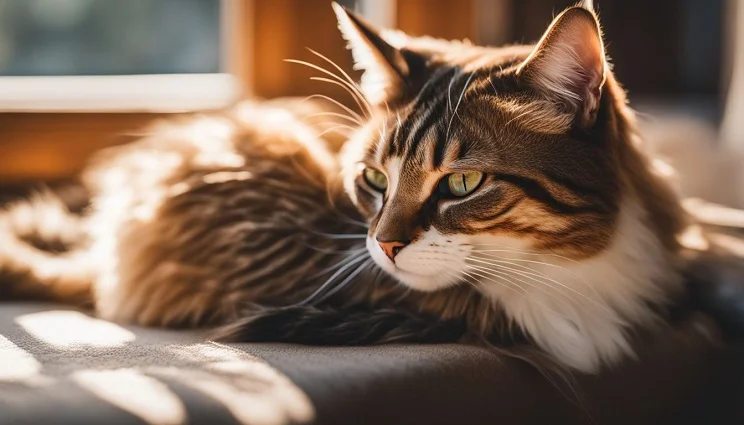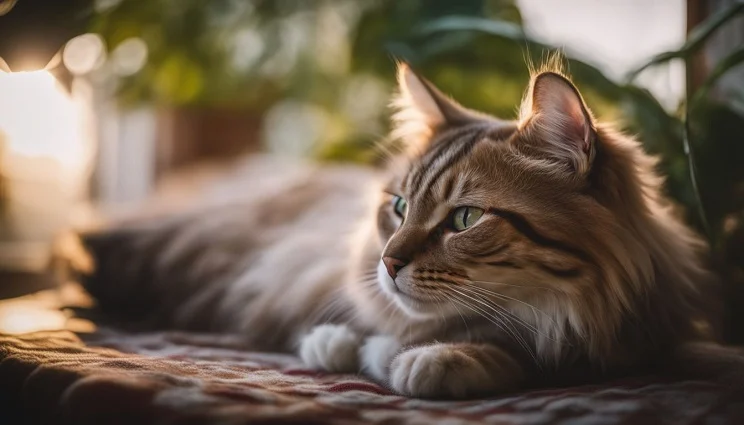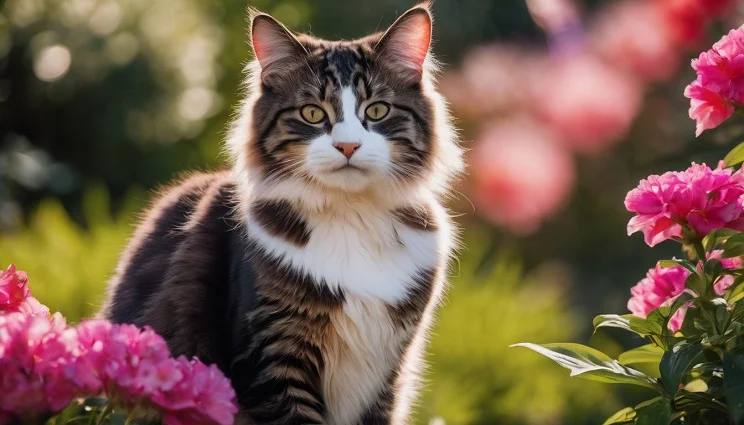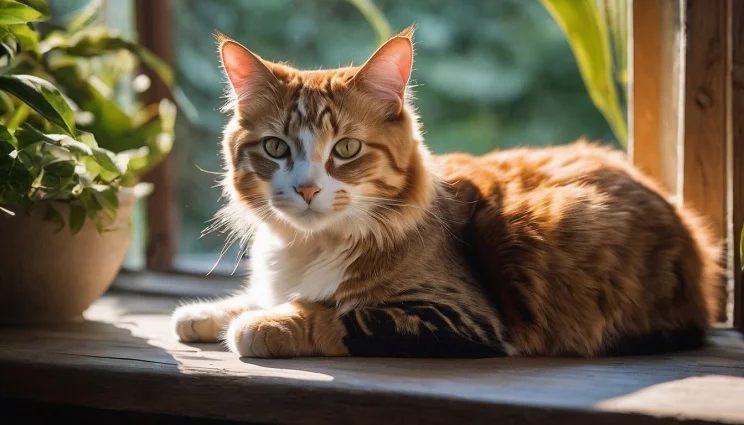Are you struggling to get your cat to calm down and snooze through the night? You’re not alone. Many cat owners face this challenge, dealing with cats that seem active at all hours or have trouble settling down.
Luckily, there’s hope. Keeping your cat awake longer during daylight can vastly improve their nighttime sleep quality.
In this article, we’ll explore effective steps to create a peaceful bedtime routine for your cat.
Key Takeaways
- Play with your cat before bed to tire them out. Use toys that move like real animals.
- Keep feeding and playtime on a regular schedule every day. This helps cats feel safe and calm.
- Make a quiet, cozy spot for your cat to sleep. Add beds or blankets they like.
- Use puzzle feeders and interactive games to keep your cat’s mind sharp and avoid boredom.
- Check with the vet if your cat can’t sleep well or seems stressed often. They might need medical help.
Understanding Your Cat’s Sleep Habits

Cats sleep a lot, but their rest patterns are complex. Hunger, playtime needs, health problems, and even the time they eat can change how well they snooze.
The Cat Sleep Cycle
Cats spend around 16 hours a day sleeping, which is two-thirds of their life. They go through light sleep and deep sleep stages just like people do. During the light sleep period, they stay alert to noises and movements.
This keeps them ready to wake up quickly if needed. In the deep sleep stage, cats experience REM (rapid eye movement) phase where they might dream.
Their body clocks make them most active at dawn and dusk because these are hunting times for wild felines. Kittens and young adults often have bursts of energy during these times too.
Understanding this cycle can help you know why your cat might be awake when you’re trying to get some rest at night.
Factors That Affect Cat Sleep
Cats sleep a lot, but several things can mess with their snooze time. Knowing what affects their sleep helps keep them happy and healthy. Here’s a closer look:
- Hunger: A hungry cat is a restless one. My cat once meowed all night because his automatic feeder didn’t drop his midnight snack. Ensuring they have enough to eat, perhaps with an automatic dish that gives meals at set times, keeps them from waking up hungry.
- Boredom: Cats need fun and games. Without it, they get bored which makes them sleepy during the day and awake at night. Puzzle feeders and cat toys can give them mental and physical workouts.
- Pain or health issues: Just like us, cats in pain won’t sleep well. Illnesses or injuries can disturb their rest. My friend’s cat had dental pain and couldn’t settle until it was treated.
- Lack of mental stimulation: A bored cat might nap more but still feel restless. Engaging activities like clicker training sessions help tire them out in a good way.
- Age-related changes: Older cats might sleep more or less due to discomfort or cognitive changes similar to Alzheimer’s in humans.
- Environmental stressors: Changes around the house, like moving furniture or bringing home new pets, can stress them out leading to sleep problems.
Each of these factors plays a big role in how well your cat sleeps. Keeping an eye on these areas ensures your feline friend catches enough Zs!
The Impact of Nocturnal InstinctsNocturnal instincts make many cats active at night. This cat behavior comes from their ancestors, who hunted during twilight hours. Today’s housecats might not hunt, but they still feel awake and ready to play when it’s dark.
To help them adjust, try playing with your cat in the evening. Use toys that mimic prey animals like mice or birds. This uses up their energy and helps match their sleep-wake cycle more closely to yours.
An automatic feeder can give them a late-night snack, reducing nighttime wakefulness caused by hunger.
Incongruous Feeding Schedules
Feeding your cat at random times disrupts its sleep. Cats like a set schedule. If you feed them at odd hours, their body clocks get confused. This leads to more nighttime prowling and less sleep.
Establishing regular feeding times can greatly improve their rest periods.
Using tools like automatic food dispensers helps keep the feeding schedule consistent, even when you’re busy. These gadgets can provide smaller, frequent meals throughout the day, fitting perfectly with a cat’s natural eating habits.
Such a routine not only keeps your cat calmer but also encourages better sleep by reducing hunger-driven nocturnal activity.
Lack of Mental and Physical Stimulation
Cats need to play and explore to stay happy. Without enough mental and physical activities, they might sleep more just to pass the time. This isn’t good for them. My own cat started getting sluggish when I wasn’t providing new toys or games regularly.
So, I learned that changing things up keeps her alert and better rested.
To help your furry friend, try food puzzles and automatic feeders for mental challenges. These tools make cats think and work for their meals, mirroring how they would hunt in the wild.
Also, playing with your cat using leashes or interactive toys before bed can tire them out in a good way. This mix of brain exercises and physical activity helps fix sleep issues tied to boredom or restlessness, ensuring they get into healthy sleep patterns.
Tips for Helping Your Cat Relax and Sleep

To help your cat find peace and sleep, focus on their surroundings. Make sure they have cozy spots to rest and toys that keep them busy. Set up a feeding device that gives meals at regular times to match their natural eating habits.
Engage in active play with your cat using toys that mimic prey, like small stuffed animals or laser pointers, which tire them out before bedtime. Use calming sprays around their sleeping area for extra comfort.
Creating a Cat-Friendly Environment
A cat-friendly environment keeps cat happy and relaxed. Make sure to provide different areas where your cat can play and rest without stress. Set up cozy corners with soft bedding for sleep, and clear spaces filled with toys for playtime.
Add scratching posts and climbing trees to mimic outdoor activities, which keep them engaged and satisfied.
Make the house peaceful by keeping noises low and minimizing strong smells that might bother your cat. My cat showed me how important this is by always hiding whenever the house was too loud or when scented candles were burning.
Providing Appropriate Bedding
Cats love a cozy spot to sleep, and the right bed can make all the difference. Choose a cat bed that fits their need for comfort and security. This reduces stress and boosts their health.
Cats enjoy beds where they can hide, lounge, or curl up. Giving cats a special place to rest builds their confidence.
Cat beds come in many shapes and sizes to match different behaviors like hiding or cuddling. Make sure the bed is soft, warm, and placed in a quiet area of your home. This helps your cat feel safe and relaxed at bedtime or any nap time during the day.
A happy cat means fewer sleep issues for both you and them!
Establishing a Routine and Sanctuary Room
Establishing a routine and a sanctuary room are key steps to help your cat relax and sleep better. These steps make your furry friend feel safe and calm, which improves their sleep quality.
- Pick a quiet room in your home. This spot should be away from loud noises and high traffic areas. The goal is to create a peaceful environment where your cat can unwind without stress.
- Fill the sanctuary with comfortable bedding. Choose soft beds or blankets that smell like you for added comfort. Cats love cozy spots that remind them of their favorite people.
- Keep the feeding schedule consistent. Feeding your cat at the same times every day helps set their internal clock. A full belly before bedtime can encourage them to sleep through the night.
- Add toys for mental stimulation in the room. Puzzle feeders or toys that mimic prey can keep your cat entertained until they’re ready to nap.
- Use calming scents or pheromone sprays in the space. These smells relax cats and make the sanctuary more inviting for sleep.
- Make time for play before bed each night. Engage in interactive playtime to tire out your cat, making it easier for them to fall asleep afterward.
- Limit disturbances within the house during nighttime hours. Encourage everyone in the home to keep noise down once it’s time for bed, helping your cat stay asleep through nighttime disturbances.
- Visit animal health experts regularly for checkups on your pet’s well-being, especially if they show unusual sleep patterns or behaviors suggesting discomfort like alopecia due to stress.
By taking these steps, you give your cat both physical and emotional support they need to find restful sleep each night.
Interactive Playtime and Hunting Games
Interactive playtime keeps cats happy and healthy. It also builds a strong bond between you and your pet.
- Choose the Right Toys: Cats love toys that move like real prey. Use toys that flutter, bounce, or wiggle to catch their interest. Mimic the movements of birds or mice to make playtime more exciting.
- Schedule Daily Play Sessions: Set aside time each day for playing with your cat. This creates routine and expectation, making them look forward to it.
- Use Puzzle Feeders: These feeders make your cat work for their food, just like they would in the wild. It keeps them active and sharpens their hunting skills.
- Create a Safe Play Area: Make sure the play area is free from hazards. Remove any items that could hurt your cat. Safety always comes first during playtime.
- Change Toys Regularly: Keep things interesting by rotating different toys into play time sessions.. This prevents boredom and maintains engagement.
- Consider Automated Toys: Battery-operated or motorized toys can move unpredictably, thrilling your cat’s predator instinct while you’re busy or away from home.
- Play Before Meals: Cats naturally rest after hunting and eating in the wild.. Playing before meal times mimics this natural cycle, helping them relax afterward.
- Teach Tricks Using Clicker Training: This training rewards specific behaviors with a click sound followed by a treat.. It’s not only fun but also mentally stimulating for your cat.
- Build or Buy a Cat Enclosure (Cat Patio): An outdoor enclosure lets your cat explore safely.. They can watch birds or bugs, feeling like they’re on a hunt.
- Interactive Games That Mimic Hunting: Use laser pointers or wand toys to simulate prey movements.. Just be sure to let your cat catch the “prey” often so they feel satisfied.
Remember, every cat is unique with their own preferences for play.. By trying different activities and games, you will discover what makes your furry friend happiest.
Other Options
Cats need fun and safety to sleep well. Here are three ways to make them happy and sleepy.
- Cat Enclosures: These are safe outdoor spaces for cats. They can play, explore, and nap in the fresh air. This keeps them active and tires them out for a good night’s sleep. Make sure the enclosure is secure from predators and has comfy spots for resting.
- Clicker Training: This method uses a small hand-held device to teach cats tricks or good behaviors. It gives mental exercise which makes them smarter and happier. Start with simple commands like sitting or staying. Reward them with treats to keep them interested.
- Hiring a Cat Minder: When you’re away, a cat minder takes care of your pet at home. They play with your cat, feed it, and keep it company. This prevents loneliness and stress, helping your cat stay calm and ready to sleep when needed.
These options offer cats fun activities and security, making relaxation and sleep much easier for them.
Dealing with Common Sleep Issues in Cats
Cats sometimes face sleep problems like humans do. These issues can include feeling stressed, changing homes, getting older, or having health troubles.
To help your cat sleep better, think about their daily routine and habitat. Make sure they have a calm place to rest and try using toys to keep them busy during the day. Also, talking with a pet health expert can give you ways to address your cat’s needs better.
If your cat seems extra sleepy or can’t sleep well, it could be due to medical reasons or changes in their environment. Always check with a vet if you’re worried about your cat’s sleep patterns.
Cats love routines and feel safe when things are predictable. Set up feeding times and play sessions at the same hours each day to help them relax.
Creating a great sleeping area is crucial too. Look for cozy beds that fit your cat’s size and places where they like hanging out.
Also Read:
Why Does My Cat Lay on My Chest? Reasons for This Behavior
Conclusion
Help your cat unwind and drift off to peaceful slumber with these simple steps. Make their space cozy, feed them a light snack before bed, and stick to a bedtime routine. Engage them in lively play during the day so they’re ready to rest at night.
Don’t forget, calming sprays like Feliway can work wonders for easing stress. With love and consistency, your furry friend will enjoy deep, refreshing sleep every night.




